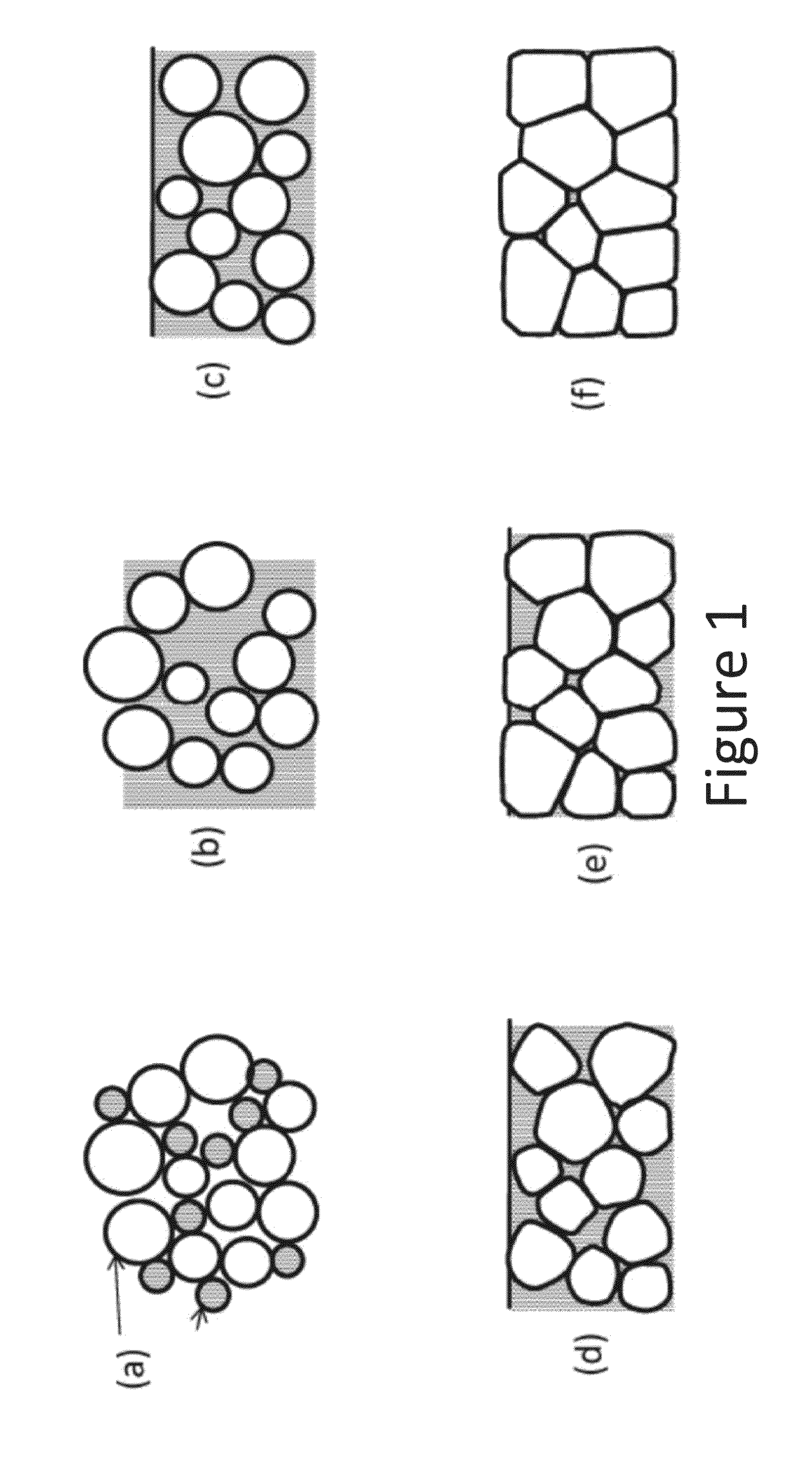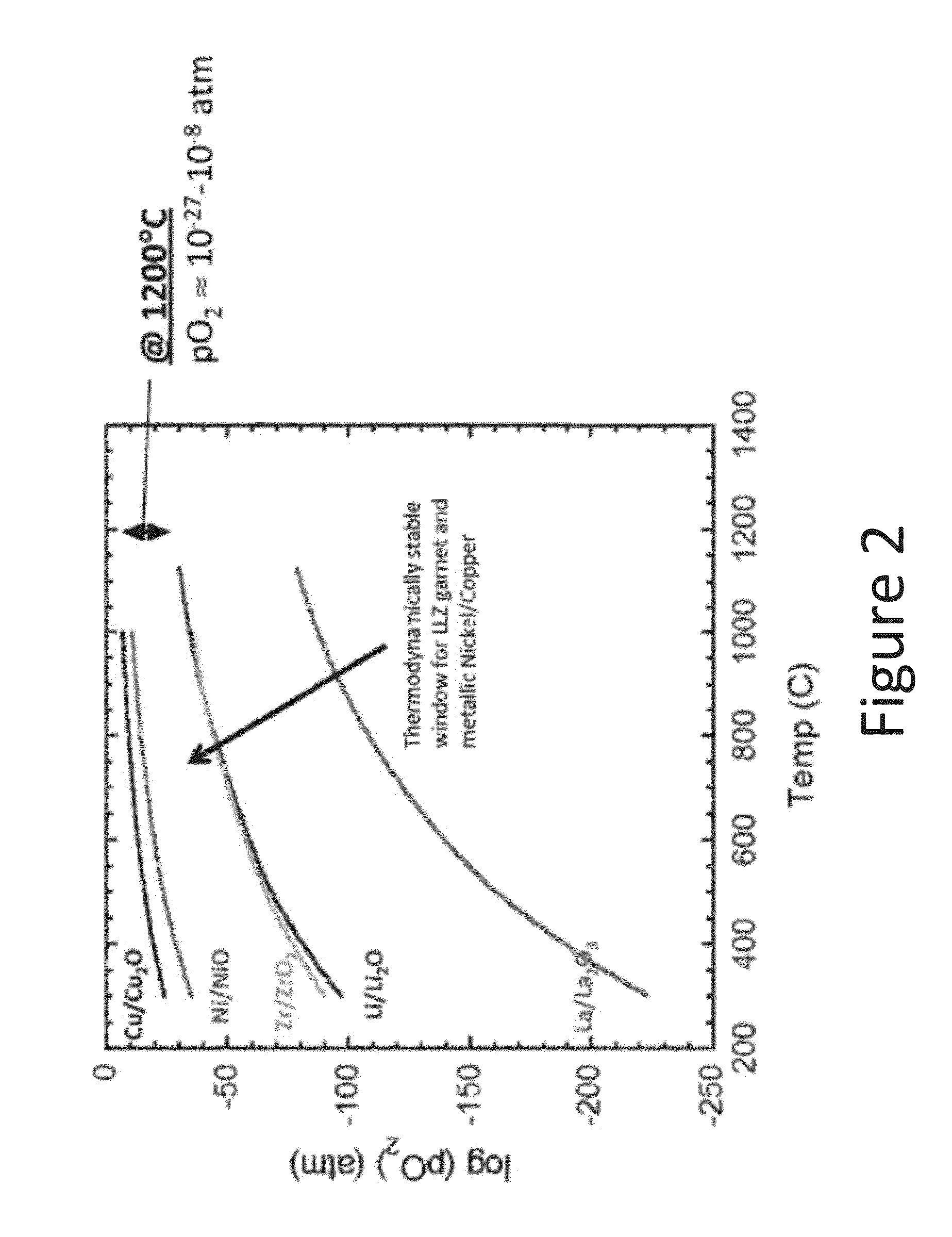Garnet materials for li secondary batteries and methods of making and using garnet materials
a secondary battery and garnet technology, applied in the field of garnet materials for li secondary batteries and methods of making and using garnet materials, can solve the problems of insufficient conductivity and particle connectivity of garnet materials, inability to stabilize solid-state battery operating voltage ranges, and inability to achieve the proper morphology of garnet materials, e.g., sufficient conductivity and particle connectivity to function sufficiently well
- Summary
- Abstract
- Description
- Claims
- Application Information
AI Technical Summary
Benefits of technology
Problems solved by technology
Method used
Image
Examples
example 1
a. Example 1
Flux Deposition of Li Conducting Ceramic
[0482]In some example, a preformed garnet material, i.e., seed crystal, is used to prepare other garnet materials. In this Example, 100 grams (g) of Li7La3Zr2O12 is mixed with 31.03 g of Li2CO3, 58.65 g of La2O3, and 29.57 g ZrO2. The resulting mixture was ball milled in isopropanol for twenty four hours. The mixture was then dried and subsequently calcined at 900° C. for twelve hours and then sintered at 1100° C. for twelve hours. The product resulting was milled again in isopropanol to reduce the average particle size to 1 μm.
example 2
b. Example 2
Flux Deposition of Li Conducting Ceramic
[0483]In this example, thin film garnet electrolytes that are 3 μm to 50 μm are prepared. In this example, the garnet precursors were LiOH / Li2CO3 / LiCO2 / La2O3 / ZrO2. The precursors were milled using 0.3 mm yttria stabilized zirconium oxide grinding media beads. The milled precursors were dispersed in a slurry formulation, and the slurry was deposited onto a metal foil. The slurry was then dried, pressure was applied to the film with plates, and heated to sinter the components therein. Doped compositions were prepared using AlNO3 and Al2O3 as sources of Al. Nb2O5 was a source of Nb, and Ta2O5 was used as a source of Ta.
[0484]The garnet precursor slurry was deposited onto a metal foil substrate. A piece of nickel of about 0.5 mil thickness was used as a base substrate. A cleaning method was used to prepare the substrate. In one case, an IPA solvent was used to remove residual organics on the surface of the metal foil. Other surface cle...
example 3
c. Example 3
Densification with Bismuth Flux
[0488]Lithium stuffed garnet powder was densified in this example using a flux composed of 1:1 mixture of Li2CO3 and B2O3.
[0489]FIG. 52 shows the resultant density of lithium stuffed garnet films as a function of the heating conditions of the flux: 900° C., 30 minutes, (bottom curve); 950° C., 30 minutes, (second from bottom curve); 950° C., 6 hours, (third from bottom curve); 100° C., 30 minutes, (top curve).
PUM
| Property | Measurement | Unit |
|---|---|---|
| Temperature | aaaaa | aaaaa |
| Temperature | aaaaa | aaaaa |
| Temperature | aaaaa | aaaaa |
Abstract
Description
Claims
Application Information
 Login to View More
Login to View More - R&D
- Intellectual Property
- Life Sciences
- Materials
- Tech Scout
- Unparalleled Data Quality
- Higher Quality Content
- 60% Fewer Hallucinations
Browse by: Latest US Patents, China's latest patents, Technical Efficacy Thesaurus, Application Domain, Technology Topic, Popular Technical Reports.
© 2025 PatSnap. All rights reserved.Legal|Privacy policy|Modern Slavery Act Transparency Statement|Sitemap|About US| Contact US: help@patsnap.com



